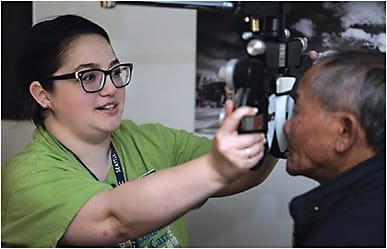Rewarding myself by aiding underserved populations.
During my 14 years as a Certified Ophthalmic Assistant, I have tried to find ways to help my community. Through volunteer work for Snohomish County’s Department of Emergency Management I was put in touch with VOSH-Northwest, a chapter of VOSH International, a non-profit that helps provide vision care to the underserved populations in other countries, including Mexico, Uganda, and Peru.
While at VOSH-Northwest, the organization’s leadership recommended me for the role vision director for the Seattle/King County Clinic (SKCC).
See a need, fill a need
At SKCC, where I’ve served since 2014, I oversee vision support and clinical staff, coordinate operation practices, maintain volunteer organization and training, provide conflict resolution, and spearhead volunteer recruitment. SKCC offers full-scale medical, dental, and vision care to all who need it with no questions asked. The clinic is open four days at Seattle’s Key Arena and serves close to 4,000 patients per year, with about 1,200 per year in vision alone. Since 2014, SKCC has provided no-cost care to over 20,000 patients with over $17 million in direct services.
Vision patients receive the same caliber care they would in a private ophthalmology practice, for example, imaging, and custom-made glasses. We also facilitate pro-bono follow-up care for serious cases involving diabetic retinopathy, glaucoma, and cataracts, including post-op care, via partnerships with local organizations and practices.
In the vision department, more than 40 industry volunteers per day come from local practices throughout the Puget Sound to provide care. These include opticians, assistants, technicians, optometrists, and ophthalmologists; some even travel from out of state to join us.
Seeing differently
As a moderate myope, I understand the importance of good eyesight. A lot of the patients I see at SKCC have difficulty affording glasses on their own. Some of the patients struggle with housing and feeding their families so they put their own vision needs on the back burner regarding priorities. I am overjoyed to be able to help ease at least one of their struggles.

My experiences with eye-related charities have taught me to see things a bit differently regarding how I treat patients in my day-to-day duties as a COA at The Everett Clinic, in Everett, Wash. At SKCC, we only see patients for an hour or so every year of their lives; we have no idea what happened the day, the week, or the month before they came in. Knowing that some of our patients are struggling with the key three requirements for life (housing, sustenance, security) helps remind me that our patients need patience, grace, and maybe just someone to smile at them, encourage them, and help them feel secure in their care. That old saying “Don’t judge a book by its cover” holds true.
Giving more
SKCC and VOSH-Northwest are just two of the ways I help the community. I also volunteer for the Healthy Athletes Program for Special Olympics in Washington State as a COA. I got involved last year, and volunteer during their summer and fall games. Most states have their own programs and I highly encourage anyone in the field to volunteer for a Special Olympics event if possible. Giving back to the community has been so rewarding for me, and I’m sure many others will feel the same. OP








